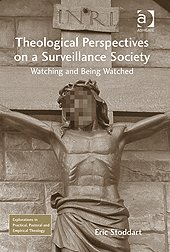 The Church has not always had a laudable record on her monitoring of people’s behaviour. Systems of pastoral care have attempted to hold the heads of families responsible for the moral and doctrinal integrity of villages and towns. Inquisitorial regimes have placed adherence to official doctrine ahead of concerns of liberty and even deployed physical harm supposedly for the sake of some souls’ eternal destination. I believe that is important that we acknowledge our chequered history up front because I think it offers us some insight into why Christians need to think seriously and, I suggest, differently, about surveillance than their predecessors.
The Church has not always had a laudable record on her monitoring of people’s behaviour. Systems of pastoral care have attempted to hold the heads of families responsible for the moral and doctrinal integrity of villages and towns. Inquisitorial regimes have placed adherence to official doctrine ahead of concerns of liberty and even deployed physical harm supposedly for the sake of some souls’ eternal destination. I believe that is important that we acknowledge our chequered history up front because I think it offers us some insight into why Christians need to think seriously and, I suggest, differently, about surveillance than their predecessors.
Too much of Christian ideas about surveillance have been predicated on a fundamental image – of God on high observing, as a potentate might, his kingdom. Letting that watching be known then influences how people behave – because ‘God sees everything you’re doing’. Such attempts do not only work to modify what children do – but adults also. In my project I start from a different place – from the Cross – where Jesus, as one who himself was under surveillance by religious and political authorities, watches the world with loving care. In other words, the God who watches over us is the God who is crucified. Rather than leaning on metaphors and artistic images closer to those appropriate for palaces I favour thinking about surveillance in terms of Jesus’ solidarity with us. I am particularly interested in what his solidarity means for those who are variously disadvantaged by surveillance.
When particular ethnic groups are disproportionately and unjustly subject to the state’s digital gaze there ought to be something theological that a Christian can say. If the targets of surveillance are people receiving welfare benefits then it is important to ask about Jesus’ solidarity not only as a theological theme but as a practice of the Christian community. The ways in which treasured traditions of friendship are mutating within online social networks Christian people should be critical – within which knowing what to affirm and what to resist is an integral dimension.
My theological vision comes into focus around challenges and opportunities for human flourishing – but flourishing through participation in the life that is Christ, available to us in the Spirit. It is flourishing that is suspicious of doctrines and critical of power. In other words, being fully human includes being alert to what is forming us, who is promulgating this, and what our options are for resisting and endorsing. Bringing such a vision to surveillance demands a broad range of questions – and not merely those more narrowly concerned with traditionally-posed ‘theological’ issues.